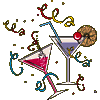

Family Network



|

Family Network



|
|
 Birthday Celebrations Net 
New Year Traditions The ancient Armenians had been celebrating the coming of the New Year on the 21st of March. That date is not only the first day of the spring, but also the birthday of the mythical God Vahangn, in whom believed the pagan Armenians about 10 thousand years ago. On this day the Armenians prepared huge feasts to welcome and celebrate the zenith of the nature. During the 18th Century, January 1st was accepted as a beginning of the New Year. In spite of this change, Armenians in many regions of the country, like Suni, Artzah and Udik, continued to celebrate New Year on Navasard. Gradually at the end of the 20th century all Armenians adopted the 1st of January as the official first day of the New Year. In Armenia it was a custom that on New Year's Eve, children gathered in-groups and went around their village, singing songs and greeting the New Year by singing to their neighbors. They usually received lots of fruit as present. Decorating a New Year's tree was not one of the customs in the past. Within the family, it was a custom for the family members to exchange presents, but, a wife never received a present from her husband, as this was considered a disgrace. Children in the family, the youngest ones following the elderly, would go to their father, who had the presents hidden in his coat, and after kissing their father's hand everyone would receive their present. Parts of the traditional New Year's meal like various dried fruits, raisins, different kinds of nuts, gahin and others would have been previously prepared, but the pastries, cakes and harisan would have been prepared on the 30th of December. The most important among the pastries was the Darin, which was presenting the New Year. Darin is a big flat bread, which has a coin hidden in it. The person who found the piece with the coin in it was considered the 'lucky' member of the family for the New Year. But the most remarkable meal is the dolma, which is prepared with rice and grape leaves. Armenian women cook Darin for their family. The bread is kneaded with luck and good wishes pressed into the dough before it is cooked. And there was no New Year celebrated without Kata, which is made of wheat flour, butter, milk and sugar. As well as the Anush Abur which is a sweet soup which is made of wheat, kernels and dried fruits.
  Mens.Net | Womens.Net | Mothers.Net | Fathers.Net | Grandparents.Net | Teenagers.Net | Santas.Net | EasterBunnys.Net | JackOLanterns.Net | FatherTimes.Net | StValentines.Net HarvestFestivals.Net | BirthdayCelebrations.Net | ToothFairys.Net
 Please read our Legal Statement and Privacy Policy.
|